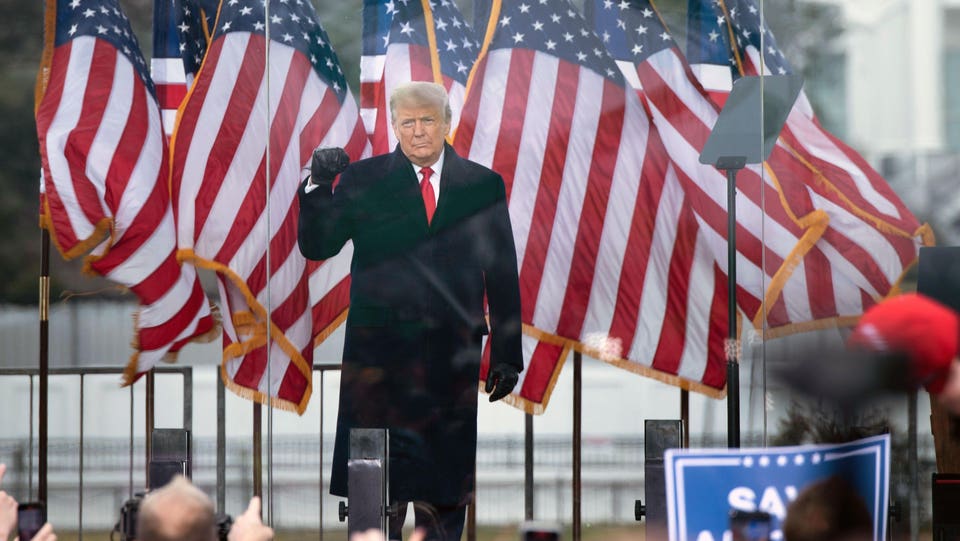Topline A federal appeals court Friday has once again declined to throw out a civil case trying to hold former President Donald Trump liable for the Jan. 6, 2021, riot at the Capitol building —the latest in a string of court rulings striking down Trump’s claim he has “presidential immunity” from legal consequences as the argument likely soon heads to the Supreme Court. Then-President Donald Trump speaks to supporters from The Ellipse near the White House on January 6, .
. . [+] 2021, in Washington, DC.
Key Facts A panel of judges at the Court of Appeals for the D. C. Circuit declined to throw out a civil case brought against Trump and some of his allies by Capitol Police officers who were at the Capitol on Jan.
6, which seeks to hold the ex-president liable for the injuries they sustained during the riot. Trump has tried to dismiss the case and other similar lawsuits against him by claiming he has “presidential immunity” from any legal liability, because his actions to overturn the 2020 election and speak to supporters ahead of the Jan. 6 riot were undertaken while he was president.
The Supreme Court may ultimately decide the issue of immunity as part of a separate criminal case against Trump, as the Department of Justice asked it to quickly rule on the issue earlier this month, but the court declined , meaning it will have to go through a lower court first. The D. C.
Circuit already rejected Trump’s argument in similar Jan. 6 civil cases brought by police officers and Democratic lawmakers earlier in December, finding that Trump’s alleged incitement of the rioters were campaign activities and not part of his official duties as president, and “actions taken in an unofficial capacity cannot qualify for official-act immunity. ” Appeals court judges said Friday that the police officers’ case was “indistinguishable” from the cases in the earlier ruling “in all relevant respects,” and so the court refused to dismiss the case against Trump on the same legal grounds as its earlier ruling.
The appeals court rulings follow district court rulings that refused to throw out Jan. 6 civil cases in the lower courts, and judges have similarly rejected Trump’s “ presidential immunity ” argument in writer E. Jean Carroll’s defamation lawsuit against him and the federal criminal case against Trump for trying to overturn the 2020 election.
Trump campaign spokesperson Steven Cheung has not yet responded to a request for comment. What To Watch For The police officers suing Trump are asking for a declaratory judgment that Trump’s actions violated federal law, as well as an unspecified amount in damages. With the appeals court’s ruling Friday, the case against Trump will continue moving forward in district court, and it’s unclear when it could go to trial.
The D. C. Circuit is also separately considering whether Trump has immunity from the criminal charges against him for trying to overturn the 2020 election, after U.
S. District Judge Tanya Chutkan ruled he didn’t. The court will hear arguments in that dispute on Jan.
9. Key Background The Capitol Police case is part of a string of civil lawsuits filed in the months after the Jan. 6 riot seeking to hold Trump liable for his role in inciting the insurrection, which have since been followed by federal and state prosecutors bringing criminal charges against Trump for his efforts trying to overturn the 2020 election.
Trump has frequently relied on claims of “presidential immunity” to get him out of his legal issues, though what the scope of that immunity actually is remains an open legal question. The DOJ has long held that presidents cannot be criminally indicted while in office—arguing in a memo it “would impermissibly undermine the capacity of the executive branch”—and the Supreme Court ruled in Nixon v. Fitzgerald that presidents can’t be held liable in civil cases for actions they undertook as part of their official duties.
(It separately found in Clinton v. Jones that presidents can be sued in civil court for actions taken before they were president. ) The Supreme Court has never ruled on the issue of whether ex-presidents are immune from criminal charges, however, and the Nixon v.
Fitzgerald ruling only concerned official acts undertaken in office. In 2020, the Supreme Court ruled against Trump’s claims that being in the Oval Office could get him out of a grand jury subpoena for his tax returns. “No citizen, not even the President, is categorically above the common duty to produce evidence when called upon in a criminal proceeding,” Chief Justice John Roberts wrote for the court.
What We Don’t Know If the Supreme Court will ultimately determine the issue of Trump’s presidential immunity. The DOJ asked the high court to take up whether Trump should be immune from his federal election criminal charges—wanting justices to rule speedily and not wait for the appeals court to issue its ruling first—but the Supreme Court ultimately declined to do so, meaning the case will first go to the appeals court. Once that court weighs in, however, it’s broadly expected the Supreme Court could take it up at that point, potentially issuing a landmark ruling on whether ex-presidents are immune from criminal charges.
It’s unclear when such a ruling could come out—and how much the court’s deliberations could delay Trump’s planned March 2024 trial date. Further Reading Trump Can Be Sued For Inciting Jan. 6, Appeals Court Rules (Forbes) Is Trump Immune From Criminal Charges? What To Know About ‘Presidential Immunity’ As Supreme Court Weighs Taking Up Case.
(Forbes) Supreme Court Won’t Take Up Trump’s Jan. 6 Charges—At Least For Now (Forbes).
From: forbes
URL: https://www.forbes.com/sites/alisondurkee/2023/12/29/court-rules-presidential-immunity-doesnt-get-trump-out-of-jan-6-allegations-again/



